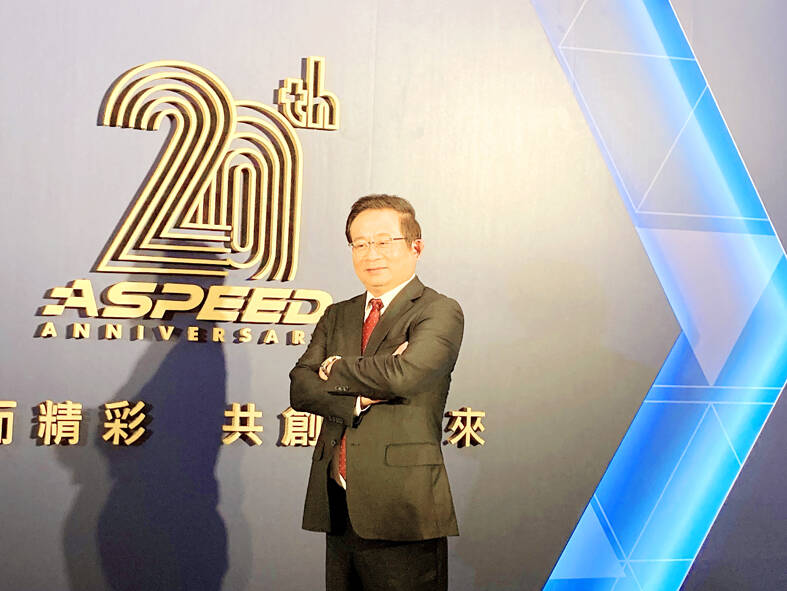Aspeed Technology Inc (信驊), the world’s biggest supplier of baseboard management controllers (BMC) used in servers, yesterday gave a bullish revenue outlook for next year mainly driven by constantly strong demand for artificial intelligence (AI), following explosive growth this year.
During the first 10 months of this year, Aspeed has witnessed annual growth of 104 percent in revenue to NT$5.04 billion (US$155 million), significantly outpacing its earlier estimate of between 40 percent to 50 percent growth, thanks to exuberant demand for general servers and AI servers, Aspeed chairman and president Chris Lin (林鴻明) said.
“Demand is surprisingly good this year,” Lin said. “For next year, we have got a feeling that it will be a better year, given that a lot of customers are hiking their capital expenditures on AI servers. We are optimistic about overall revenue prospects next year, despite muted demand for general AI servers.”

Photo: Lisa Wang, Taipei Times
The AI boom could elevate AI server revenue to between 20 percent and 25 percent of the company’s overall revenue next year, compared with about 15 percent this year, Lin said.
Aspeed commands 70 percent of the world’s BMC market.
On its product development progress, Lin said the company is working with customers to develop next-generation BMCs and expects the new controller, code-named AST2700, to ramp up production in 2026. Aspeed aims to hold steady its gross margin at 65 percent through adjusting new product prices, he said.
The company saw its quarterly net profits soar 43.5 percent sequentially, or up 170 percent annually, to NT$729 million last quarter, setting an all-time high. That brought the first three quarters’ net profit to NT$1.63 billion, more than four times the firm’s share capital of NT$378 million.
Gross margin improved to 64.3 percent last quarter from 63 percent a year earlier.
Each AI server rack based on GB200/NVL72 chips from Nvidia Corp would consume 87 BMCs, a surge from 12 BMCs used in the AI server rack powered by H100 chips, Aspeed said.
As Aspeed turns 20 years old this year, Lin said the company was inspired by Quanta Computer Inc (廣達) producing the world’s first BMC in 2004. Since then, Aspeed’s small single-chip BMC has gradually replaced its chunky and expensive predecessors at affordable prices, Lin said.
Quanta assembles notebook computers for Apple Inc and makes servers for Nvidia, and is one of the biggest customers of Aspeed today.
Nvidia considers Aspeed’s BMC an essential part of its AI servers, and yet an “inexpensive” chip, Lin said.

Sweeping policy changes under US Secretary of Health and Human Services Robert F. Kennedy Jr are having a chilling effect on vaccine makers as anti-vaccine rhetoric has turned into concrete changes in inoculation schedules and recommendations, investors and executives said. The administration of US President Donald Trump has in the past year upended vaccine recommendations, with the country last month ending its longstanding guidance that all children receive inoculations against flu, hepatitis A and other diseases. The unprecedented changes have led to diminished vaccine usage, hurt the investment case for some biotechs, and created a drag that would likely dent revenues and

Global semiconductor stocks advanced yesterday, as comments by Nvidia Corp chief executive officer Jensen Huang (黃仁勳) at Davos, Switzerland, helped reinforce investor enthusiasm for artificial intelligence (AI). Samsung Electronics Co gained as much as 5 percent to an all-time high, helping drive South Korea’s benchmark KOSPI above 5,000 for the first time. That came after the Philadelphia Semiconductor Index rose more than 3 percent to a fresh record on Wednesday, with a boost from Nvidia. The gains came amid broad risk-on trade after US President Donald Trump withdrew his threat of tariffs on some European nations over backing for Greenland. Huang further

CULPRITS: Factors that affected the slip included falling global crude oil prices, wait-and-see consumer attitudes due to US tariffs and a different Lunar New Year holiday schedule Taiwan’s retail sales ended a nine-year growth streak last year, slipping 0.2 percent from a year earlier as uncertainty over US tariff policies affected demand for durable goods, data released on Friday by the Ministry of Economic Affairs showed. Last year’s retail sales totaled NT$4.84 trillion (US$153.27 billion), down about NT$9.5 billion, or 0.2 percent, from 2024. Despite the decline, the figure was still the second-highest annual sales total on record. Ministry statistics department deputy head Chen Yu-fang (陳玉芳) said sales of cars, motorcycles and related products, which accounted for 17.4 percent of total retail rales last year, fell NT$68.1 billion, or

MediaTek Inc (聯發科) shares yesterday notched their best two-day rally on record, as investors flock to the Taiwanese chip designer on excitement over its tie-up with Google. The Taipei-listed stock jumped 8.59 percent, capping a two-session surge of 19 percent and closing at a fresh all-time high of NT$1,770. That extended a two-month rally on growing awareness of MediaTek’s work on Google’s tensor processing units (TPUs), which are chips used in artificial intelligence (AI) applications. It also highlights how fund managers faced with single-stock limits on their holding of market titan Taiwan Semiconductor Manufacturing Co (TSMC, 台積電) are diversifying into other AI-related firms.